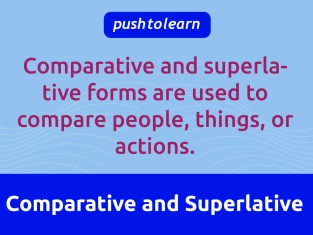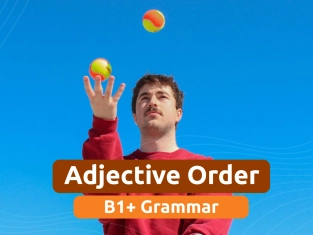by PushtoLearn
Intensificadores en inglés
Tabla de contenidos
Intensifiers – Ejercicios
Estos ejercicios se enfocan en los intensificadores.
¿Qué son los intensificadores?
Los intensificadores son palabras que se usan para hacer los adjetivos más fuertes. En lugar de decir simplemente interesting, puedes decir very interesting para agregar énfasis. Estas palabras ayudan a expresar emociones con mayor intensidad y hacen las descripciones más vividas.
Intensificadores comunes incluyen:
- very → It’s a very exciting story.
- really → She is really happy today.
- extremely → The test was extremely difficult.
Usar intensificadores correctamente hace que tu inglés suene más natural y expresivo.
Intensificadores comunes y su uso
Aquí tienes algunos intensificadores y cómo fortalecen los adjetivos:
|
Intensificador |
Ejemplo |
|
amazingly |
She is amazingly talented. |
|
exceptionally |
He is exceptionally smart. |
|
incredibly |
The view was incredibly beautiful. |
|
particularly |
That joke was particularly funny. |
|
remarkably |
She was remarkably calm during the test. |
|
unusually |
It’s unusually cold today. |
Usar “Enough” como intensificador
"Enough" es diferente de otros intensificadores porque va después del adjetivo:
✅ He is old enough to drive.
✅ These shoes aren’t big enough for me.
🚫 He is enough old to drive. (¡Incorrecto!)
Intensificadores con adjetivos fuertes
Algunos adjetivos ya tienen un significado fuerte. Por ejemplo, en vez de very big, usamos enormous. En vez de very small, usamos tiny.
Aquí tienes algunos ejemplos de adjetivos normales y sus formas fuertes:
|
Adjetivo normal |
Adjetivo fuerte |
|
very big |
enormous, huge |
|
very small |
tiny |
|
very clever |
brilliant |
|
very bad |
awful, terrible, dreadful |
|
very sure |
certain |
|
very good |
excellent, perfect |
|
very tasty |
delicious |
📌 No se usa “very” con adjetivos fuertes:
🚫 The food was very delicious. (¡Incorrecto!)
✅ The food was absolutely delicious. (Correcto)
Intensificadores comunes con adjetivos fuertes
Con adjetivos fuertes, usamos intensificadores como:
-
absolutely → The hotel was absolutely perfect.
-
completely → I was completely exhausted after the trip.
-
exceptionally → She is exceptionally brilliant.
-
utterly → The weather was utterly dreadful.
Intensificadores con ciertos adjetivos
Algunos intensificadores solo se usan con ciertos adjetivos:
|
Intensificador |
Adjetivos con los que se usa |
Ejemplo |
|
dangerously |
ill, hot |
He is dangerously ill. |
|
seriously |
damaged, hurt |
The car was seriously damaged. |
|
highly |
successful, intelligent, likely |
She is highly intelligent. |
|
bitterly |
disappointed, unhappy, cold |
I was bitterly disappointed. |
📌 Ejemplos incorrectos y correctos:
🚫 We had a highly tasty meal.
✅ We had a very tasty meal.
🚫 It was bitterly good.
✅ It was really good.
📌 Debes consultar un diccionario para saber qué intensificadores combinan con qué adjetivos.
Intensificadores con comparativos y superlativos
Usamos intensificadores distintos con adjetivos comparativos y superlativos.
Intensificadores con comparativos:
|
Intensificador |
Ejemplo |
|
much |
He is much taller than me. |
|
far |
This book is far better than that one. |
|
a lot |
New York is a lot bigger than Boston. |
|
a great deal |
The second movie was a great deal more interesting. |
🚫 He is very older than me. (Incorrecto)
✅ He is much older than me. (Correcto)
Intensificadores con superlativos:
|
Intensificador |
Ejemplo |
|
easily |
This is easily the best movie I’ve seen. |
|
by far |
She was by far the most talented singer. |
🚫 This is very the best book. (Incorrecto)
✅ This is by far the best book. (Correcto)
Adjetivos como intensificadores
Algunos adjetivos pueden actuar como intensificadores cuando se usan con sustantivos:
|
Adjetivo |
Ejemplo |
|
absolute |
That’s an absolute disaster. |
|
complete |
He’s a complete idiot. |
|
total |
That was a total failure. |
|
perfect |
It’s a perfect opportunity. |
|
utter |
They were talking utter nonsense. |
🚫 The idiot was complete. (Incorrecto)
✅ He’s a complete idiot. (Correcto)
🚫 The nonsense was utter. (Incorrecto)
✅ They were talking utter nonsense. (Correcto)
Errores comunes con intensificadores
|
Error |
Corrección |
|
He is enough tall to play basketball. |
He is tall enough to play basketball. |
|
She is very exhausted. |
She is absolutely exhausted. |
|
This is very the best option. |
This is by far the best option. |
|
He was bitterly happy. |
He was really happy. |

FAQ: Intensificadores
¿Qué es un intensificador?
Un intensificador es una palabra que hace que un adjetivo sea más fuerte, como very, really o extremely.
¿Puedo usar “very” con adjetivos fuertes?
No, debes usar palabras como absolutely o completely.
Por ejemplo: di absolutely amazing en vez de very amazing.
¿Cuál es la diferencia entre “too” y “enough”?
Too significa más de lo necesario (negativo): The coffee is too hot to drink.
Enough significa la cantidad adecuada (positivo): The coffee is hot enough to enjoy.
¿Qué intensificadores se usan con comparativos?
Palabras como much, far, a lot y a great deal refuerzan los comparativos.
Ejemplo: He is much faster than me.
¿Cuáles son errores comunes con intensificadores?
Algunos errores comunes son:
-
Usar "very" con adjetivos fuertes (very excellent ❌)
-
Poner "enough" antes del adjetivo (enough big ❌)

